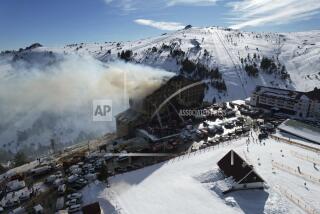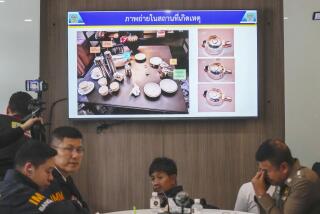Pakistan hotel reopens with caution after deadly blast
- Share via
ISLAMABAD, PAKISTAN — It was a place where diplomats hobnobbed over sushi, army generals and senators married off their sons and daughters, and society matrons exchanged choice tidbits of gossip while working out in the well-appointed gym.
When suspected Islamic militants used a massive truck bomb to blow up the five-star Marriott hotel in the heart of Pakistan’s capital three months ago, killing more than 50 people, many educated, affluent Pakistanis likened the gaping crater left in the parking lot to their own hollowed-out sense of security.
On Sunday, the hotel reopened for business on a limited scale -- with a thick, 14-foot-high blast wall in place, with some staff members still on leave as they recover from injuries and with scores of scorched rooms still waiting to be refurbished.
Uniformed bellhops and reception clerks received tearful greetings from longtime customers, sometimes blinking away tears in return. Guards armed with automatic weapons patrolled the marbled lobby while lounge music tinkled in the background. Sniffer dogs nosed parcels and purses. Many of the invited guests attending the opening -- politicians, VIPs and diplomats -- vowed not to let security fears keep them away.
“It’s an axis of life here,” said Zainab Omar, a television host and art dealer. “Islamabad is a small city, and the Marriott is really integral to our daily lives.”
The crowd on hand Sunday for high tea in the main banquet room was an unmistakably well-heeled one. Elegantly coiffed women wore silk and chiffon shalwar kameez, the traditional Pakistani dress. “Oh, I must have a quick word with the ambassador,” murmured one Pakistani businessman, bowing as he excused himself from a knot of cohorts.
Hotel staff seemed to share in the sense of optimism and solidarity the reopening brought -- particularly the women. In a country where many families still urge wives and daughters to stay home, the hotel has long been a respectable place for young women to aspire to work as concierges, gym attendants or even senior managers.
Ghazala Akbar, who heads the front office after a decade with the group that owns the franchise in Pakistan, said she and other employees “worked night and day, very literally, to achieve this reopening.”
“All of us have been like family, working together,” she said.
Amid the celebrations, though, came grim reminders of the ever-present danger from militants who have staged a concerted campaign of suicide bombings across Pakistan over the last 18 months. A suicide bomber set off a powerful explosion in a car outside a polling station Sunday in volatile northwest Pakistan, killing at least 36 people, including several children.
The attack took place in Buner, a district adjoining the scenic Swat Valley in North-West Frontier Province. Pakistani troops have been battling Islamic insurgents in the valley over the last year, with some heavy fighting in recent days.
The attack came as residents were voting in a provincial by-election, using a school as a polling place. Some voters had brought their children along, and as many as four youngsters were reported to be among the dead.
Some news accounts said the attacker lured bystanders by pretending to have mechanical difficulties, then blew up the car when a crowd had gathered. But other witnesses said the bomber rammed the vehicle into the school’s boundary wall. The street outside the school was littered with bodies, with wounded people screaming for help. The force of the blast brought down the school’s roof.
In Islamabad, the celebrants at the Marriott had their own visible proof of ongoing peril. The hotel, which is close to many government offices, is now a virtual fortress. New measures include a bulletproof antechamber where luggage will be screened, better on-site firefighting equipment and a strict ban on any vehicles inside the blast wall.
Journalists from all over the world made the hotel their headquarters in the months following the Sept. 11 attacks, and some of them were on hand for the reopening.
“When the truck bombing happened, I remember how mind-boggling it was to think of that happening here at this hotel, where we’d all come to recover from what was going on in Afghanistan,” one British journalist said.
Twenty-six hotel employees were killed in the Sept. 20 attack. In a newly built courtyard where the swimming pool used to be -- it was choked with debris and officials decided to close it -- people lighted candles and laid flowers in front of portraits of the dead. Smoke wafted from tapers of incense.
Many of the staff members who were back on duty Sunday had spent weeks or months recuperating from their injuries.
“I am very proud to be back,” said Mohammed Wasim, who was working at the reception desk when the truck bomb went off. “I remember how everything went black; it was like an earthquake. But I did my best to help my injured colleagues and our customers.”
As is the case with many major terrorist attacks in Pakistan, responsibility has not been established. The government has said it believes the militant group Lashkar-e-Jhangvi carried out the bombing, but none of the alleged ringleaders has been arrested.
“Life has to go on,” said Mohammed Asif, an assistant manager. “Every day, we will remember those who died. But we will all go on.”
--
More to Read
Sign up for Essential California
The most important California stories and recommendations in your inbox every morning.
You may occasionally receive promotional content from the Los Angeles Times.










